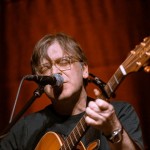As Jad Fair and Norman Blake renew their unlikely collaboration at Leaf, Getintothis’ Paul Higham considers how contrasting musical styles can make such partnerships utterly compelling.
Jad Fair and Norman Blake have, on paper at least, always seemed unlikely bedfellows. Fair is better known as one half of the abrasively lo-fi and resolutely art-punk Half Japanese and is famous for a barely tuned and idiosyncratic approach to guitar playing. Blake, as one of the principal songwriters of Teenage Fanclub, is renowned for his harmonious, melodic and doe-eyed guitar pop.
With such contrasting backgrounds, how does such a collaboration hope to come together as a cohesive whole?
If clues were to be found in the pair’s previously shared ventures then one would be forgiven for not being overly optimistic. While it is fair to say that the reaction of longstanding Teenage Fanclub fans to the band’s turn-of-the-millennium unison with Jad Fair was decidedly mixed, not all responses carried the withering venom of this Guardian review. Yet, despite the promise shown by the sunnily-disposed new album, Yes, such gigs represent a trepidatious step into the unknown.
Indeed, arriving in expectation of the duo faithfully plugging their new album would have only led to disappointment. The main set comprised a mixture of initially Fair-led songs, then Blake taking the lead on fan-favourite Teenage Fanclub compositions, before Fair took to the vocals to close out the gig. All the while, the other provided subtle backing, initially with Blake on acoustic guitar before they both took up residence behind the drums.
So much for the collaborative spirit, you say? Yet this was absolutely a collaboration, that you could sense in the obvious bond and fellowship each clearly felt for the other. Such a bond proving that artistically diverse acts can work together outside their comfort zones and free from the safety net that that provides.
This was demonstrated right from the start. Fair‘s distinctively manic and anxious stage presence as he delivered his songs in a rapid rattle of half-sung, half-spoken verse was tempered by Blake‘s thoughtful acoustic playing. Little more than a repetitive single chord strum, it provided a focus and acted as a rein on Fair‘s wilder influences.
When it was Blake‘s turn to take the lead, Fair‘s insistent if formulaic drumming added a verve and dynamism to the Teenage Fanclub star’s best loved numbers. Where the likes of It’s All In My Mind and I Don’t Want Control Of You could easily have have been safe and unchallenging, Fair lent them an edge and a purpose, without ever overshadowing his partner’s careworn vocals and, just as importantly, the inherent beauty of the songs.
If Blake‘s rendering of You Was Me recalled his own frustratingly short-lived collaboration with Euros Child of Gorky’s Zygotic Mynci, it was the return of Fair to lead vocal duties that reaffirmed the value of shared experiences. With both having previously supported Daniel Johnston, it felt appropriate that one of the evening’s high points was Fair‘s ferocious recital of Caspar The Friendly Ghost.
Frenetic and interspersed with furious squalls of guitar noise, it marked a sea-change in the night. The point where the experimental influences of Half Japanese pushed down the more melodic tendencies of Teenage Fanclub. It made for a captivating spectacle, as Blake, his eyes transfixed on Fair‘s every move, struggled manfully to keep up with his partner’s increasingly more improvised playing.
When those on stage aren’t sure where things may head, it can go one of two ways. Fortunately on this occasion the chaos stayed on the right side of organised without ever dampening the levels of interest.
It was only when the pair returned to the stage for an encore that things slackened – albeit only slightly and ironically when playing two songs from their new album. The backing-tape accompaniment felt unnecessary and the performance lost some its carefree charm as well as its intensity as a consequence.
While by no means offering the final word in collaboration, the showing demonstrated that bringing together contrasting styles can work. The lesson of this performance suggests that for collaborations to succeed each should embrace the other’s qualities while remaining loyal to their own distinctive talents.
In support we were reacquainted with the many and varied talents of Andrew Gordon Parry. Known to many as a member of emerging Liverpool garage-rock outfit Strange Collective as well as having impressed as WYWH, this time he fronted a three-piece, AJHD.
AJHD‘s set was rich in layered, textured and distorted noise, as waves of reverb heavy guitar noise filled the vast space of a barely filled Leaf. It felt incongruous to say the least to witness such a visceral display from the cosy table setting provided by such a venue.
Recalling the warped psychedelia of the likes of Spaceman 3 as well as American innovators of the shoegaze scene, such as Lawrence Chandler‘s Bowery Electric, the band seemed clear in their influences as the lengthy songs built under repetitive structures that increased progressively in intensity.
To be critical, perhaps the influences carried were worn a tad too heavily and the set lacked a bit of variety but beyond that the band were impressive. Such an impression was certainly shared by Norman Blake who offered the band an appreciative pat on the back as they cleared away their kit. Ones to watch for sure, provided Parry‘s many other commitments don’t result in his being spread too thinly.
Pictures by Getintothis’ Martin Waters.
- AJHD
- AJHD
- AJHD
- AJHD
- Jad Fair
- Jad Fair
- Norman Blake
- Jad Fair & Norman Blake
- Jad Fair & Norman Blake
- Jad Fair
- Norman Blake
- Jad Fair & Norman Blake
- Jad Fair &Norman Blake














